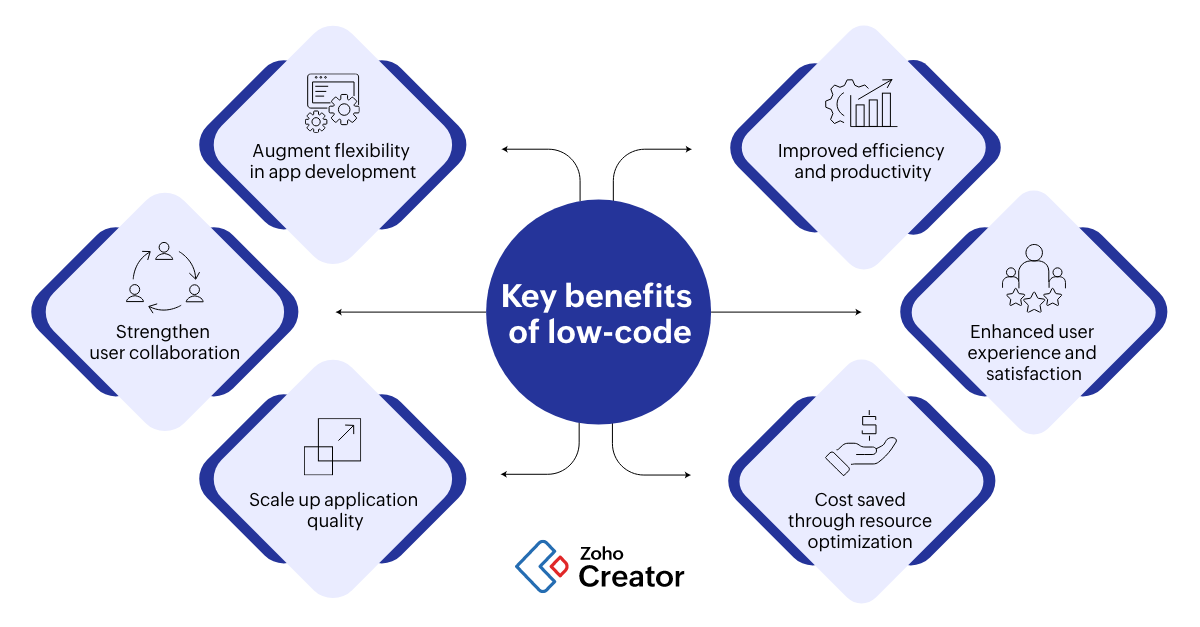Visual Development Environment :
Drag-and-Drop Interfaces: Low-code platforms provide visual tools for designing applications. Drag-and-drop elements allow developers to rapidly assemble applications without having to write code.
Many low-code platforms have built-in templates or components that enable developers to quickly test their apps and build them without needing to start from scratch.
Reduced Coding Requirements for Coding:
Automated Code Generating: Low-code platform automatically generates the code beneath based on the visual models created by developers. This removes the need to write code manually and accelerates the development process.
Reusable components: Developers have the ability to utilize reusable components across multiple projects, which reduces the time they spend writing and testing code.
Collaboration is streamlined:
Low-code development platforms are typically equipped with tools like deployment, version control, and testing. This enables seamless collaboration between teams.
Citizen Development: Business users as well as non-developers can help with application development using intuitive interfaces, which can reduce the bottleneck that is often caused by the limited availability of professional developers.
Rapid Iteration and Prototyping
Rapid Prototyping. Developers can design prototypes quickly in order to validate their ideas and receive feedback. This can lead to a more efficient iteration.
Simple Modifications. The visual nature low-code development offers makes it simple to update and change applications. This speeds up the process of improving and refining applications in response to the feedback of users.
Pre-built Integrations:
API Integrations: Low-code platforms are often pre-built with connectors for popular services and APIs. This cuts down on the time needed to connect external systems.
Data integration: Tools for data integration are included to help simplify the process.
Scaling deployment:
One-Click Deployment: A lot of low-code platforms provide one-click deployment, greatly reducing the amount of time and effort required to deploy applications.
Cloud-Based Solutions: Cloud-based, low-code platforms are able to manage infrastructure and scaling and allow developers to focus on the logic of their applications and functions instead of deployment logistics.
The primary benefit of developing applications using low-code with regard to speed, is its capacity to automatize and simplify many aspects of the process. This enables rapid delivery of software and quicker adaptations to changing requirements. Read the recommended Low-code Platform for application development blog for website examples including azure sql server, low code platforms, jdbc server, application development platforms, rad development, app platforms, multiplatform mobile app development, application modernization software, rapid action development, push alerts and more.

Low-Code Apps Are Affordable.
Low-code app development offers numerous advantages, such as cost-effectiveness. This is a great choice for companies who wish to optimize development budgets without sacrificing quality. These are the main benefits: Reduced Development Costs:
Lower requirements for coding: Low codes platforms remove the requirement for complex hand-coded apps. Developers can spend less time and effort developing apps. This results in lower costs for labor.
We need fewer resources for developers: Low-code programming is faster and easier and therefore there are fewer developers who have specialized knowledge are required. Costs for hiring and staffing can be reduced significantly.
Faster Time To Market
Accelerated Development: Low-code platforms provide visual development tools, pre-built components and other features that enable rapid development of applications. Businesses can introduce their products on the market faster. This can result faster revenue generation, and improved position in the marketplace.
Rapid prototyping: By developing and testing prototypes quickly, businesses can reduce the amount of time they invest in the development stage and allow for quicker iterations on the basis of user feedback.
Reduce the cost of maintenance
Because of their modularity and common components, applications developed on low-code platforms are easier to maintain. This reduces maintenance and support costs.
Automated Updates: A lot of low-code software platforms manage updates and patches automatically making sure that applications remain safe and up-to-date without requiring large manual intervention.
Efficient Resource Utilization:
Contributions from non-developers: Low code platforms allow non-developers, like business users, to be a part of the development process. This democratization of development allows companies to benefit from the talents of a wider variety of employees, while reducing dependence on highly-paid developers.
IT Departments can Focus on Strategic Initiatives: Instead, of being bogged down by routine work, IT departments can concentrate their efforts on strategic initiatives that improve productivity and efficiency.
Scalable Pricing Models:
Subscription-Based Price: Many low code platforms offer flexible subscription-based pricing that scales depending on use. This allows businesses to align their spending with their needs and future expansion, while avoiding huge upfront costs.
Pay-Assosiated Option: A few platform providers offer pay-assosiated options. These options ensure that companies are only liable for the services utilized, which is beneficial to entrepreneurs and small businesses that have limited resources.
Costs of Third-Party Software reduced:
Low-code platforms are often equipped with integrated functions that eliminate the need to purchase additional tools or software. This could save you cash on subscriptions and licensing fees.
Pre-Built Integrations: The possibility of having pre-built intiations with popular systems and services minimizes custom development. Savings on both time and money.
Increased ROI:
Faster return on Investment (ROI): By making use of the rapid development process, reduced costs and a shorter time to the market, businesses can achieve an increased ROI on their applications.
Improved Agility - Companies are able to swiftly adapt to changes in the market and to changing customer demands. This lets them stay relevant and to take advantage of opportunities that come up.
Reduced Cost of Training
User-friendly interfaces: Low-code systems offer user-friendly and intuitive interfaces that reduce the time required to learn. They also eliminate the requirement for lengthy training programs.
Accessible Resources A lot of low-code platforms provide complete instructional materials, tutorials and support for community members, thereby cutting the requirement for formal education and the associated costs.
Collaboration can be made easier.
Enhanced Collaboration Tools: The collaboration tools built-in to the software facilitate collaboration and communication between the team members. This results in more efficient project development process and lower overhead.
Unified Development Environment (UDE): A single, unifying development environment streamlines workflows and reduces cost and complexity that comes with managing multiple platforms and tools.
Low-code development is cost effective because it reduces development and maintenance expenses. It also speeds up time to market and optimizes utilization of resources. Pricing models can be adapted. These elements provide substantial financial advantages to companies which makes low-code development an appealing option for companies seeking to maximize their budgets while delivering solid, reliable, high-quality apps. See the best Enterprise application development with Low-code Platform advice for blog info including lowcode no code, develop mobile application, app modernisation, develop web app, cross platform app dev, rad application development, microsoft azure sql, develop web app, develop cross platform mobile app, sso azure and more.

The Advantages Of Low-Code Development For Community Members And Vendors
Low-code development platforms for applications provide substantial advantages in terms of the support provided by vendors and communities. These is essential to ensure an effective implementation, ongoing maintenance, and continuous enhancement of applications. Here are a few main benefits: Vendor support
Comprehensive Technical Support:
Support Teams: Many platforms using low-code have special support teams that assist with technical problems or troubleshooting, as well as guidance.
Support is available 24/7: Numerous vendors offer round-the-clock support that can be especially helpful for businesses operating across different time zones.
Training and Onboarding
Vendors often provide organized programs for users like tutorials and webinars. They can also offer training courses for certification.
Many vendors provide personalized onboarding to help customers use the platform efficiently and tailor it to their needs.
Regular Updates and enhancements:
Continuous improvement: Low-code platform providers typically release regular updates which contain new features, performance enhancements, and security patches, ensuring that the platform remains cutting-edge and safe.
Feedback Integration Vendors incorporate user feedback into the development process and ensure that the platform is updated in response to the changing requirements.
Comprehensive Documentation:
The Documentation In Detail: Users can find answers to their questions by referring to a detailed and organized manual that covers all aspects of the software beginning with its fundamental functionality to more advanced customization.
API References API documentation offers complete API references that can help developers connect their low-code platform apps with other platforms.
Consulting and Professional Services
Expert Consultation: Vendors frequently provide consulting services that assist in the process of strategic planning as well as design of architecture and complex implementations to ensure that users are able to use the platform to its fullest potential.
Custom Development Services - Certain companies offer custom development services for specific features or integrations not available from the standard version.
Community Support for the Community
Active User Communities:
Discussion and Forums: Many Low-code platforms feature vibrant online communities where users are able to ask questions, debate solutions, and collaborate with each other on best practices.
User Groups and Meetings Local and virtual meetings and groups of users give you the chance to study about, network, and share experiences with others.
Knowledge Sharing and Collaboration:
Community-Contributed Resources: Users often share templates, modules, and extensions that they have developed, which can be reused or adapted by others, accelerating development and innovation.
Crowdsourced Problem Solving: The collective wisdom and experience of the crowd can be a valuable source for identifying issues and figuring out creative solutions for complex problems.
Learning and Development:
Community-Led Learning: Many communities hold workshops, training sessions, and webinars which are typically run by experienced users who can share their knowledge and more advanced methods.
Online Tutorials and Courses Community members make and share tutorials, online courses and step-by-step guides. This improves the learning resources that are accessible to all users.
Feedback and Influence
Forums for Product Feedback Community forums include many channels to provide feedback to vendors. This can influence the design of features.
Beta Testing Programs - Members of the community might be able to take part in the beta testing program. This gives them the chance to see first-hand new features, as well as an opportunity to shape the development of the system.
Recognition and Encouragement
Many vendors offer community recognition programs, such as MVP programs (Most Valuable Professional) to acknowledge the efforts of their members who are active in their respective communities.
Peer Support: Community members provide peer support to others by sharing their experiences and offering guidance. They help create a cooperative and supportive environment through sharing their expertise.
In general, the combination of robust vendor support, and an engaged, active community creates a broad ecosystem of support for low-code development. This ensures that users have the knowledge, resources and collaborative opportunities to be able to build and launch their applications.
